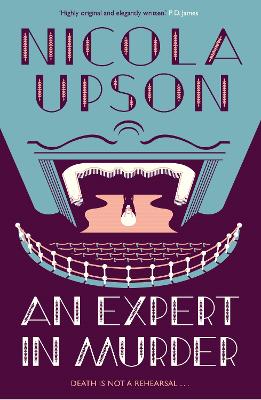Reviewed by brokentune on
It appears I may have found that most rare of things: a literary tribute (a.k.a. fan-fiction) that worked for me!
Josephine Tey was a bit of a mystery. She was a private person, little is known about her, and that which is known seems to indicate that she deliberately kept her affairs separate from each other - i.e. she led a multitude of lives - one as playwright, one as a mystery writer, one in Inverness, another in London, perhaps quite another somewhere else.
Nicola Upson took what research she could get and jumped on the idea of making this mystery woman the star of a semi-biographical murder mystery. (The murder is no biographical...I think.) For me this worked really well. It had biographical fact mixed with imagined scenes, but because we know so little about Tey, these elements change over seamlessly in Upson recreation of the 1930s London West End theatre-land, which happens to be one of my favourite places, too.
In fact, I thought the whole scene-setting, which is the undoing of many (mystery) writers for me, worked really well in this one:
We're passing by Tey's compartment on the train south from Berwick, because we learn in Tey's own The Man in the Queue that there is no direct train from Inverness, yet, and that Tey would have had to change at Edinburgh Waverley.
We get to see her being picked up by friends at King's Cross.
We get to be in the crowd queueing for theatre tickets.
We got go to the dress circle bar, mingle with the crowd outside the stage door after performances hoping to get an autograph. We get to go home with various actors and see behind the curtains.
I thought Upson's writing had an easy and fun flow to it that made this quite an easy, cozy read. Yet, she tackles quite serious issues, amongst which I was delighted to read how characters dealt with the aftermath of the First World War. Granted these parts reminded me more of Dorothy L. Sayer's writing than Tey's, but hey, I have not read all of Tey's work yet and given that Upson was trying to re-create a distinct time period in the pages of this, her first, Tey mystery, I was drawn in from start to finish.
As soon as he saw the great Union Jack which had replaced the usual hanging at the front of the pulpit, Penrose realised that God’s representative – a sanctimonious bigot at the best of times, even if he was family – had changed his agenda. After preaching a terrifying sermon on the glories of battle, sanctifying maiming, slaughter and bloodshed with the blessing of a higher authority, the rector had urged all the young men to join the army, to sate the country’s appetite for soldiers who would defend the justice of the war. What he had failed to mention was that it was a cause for which thousands of them would be asked to give their lives, but his harvest sermon had done the trick: by the end of the year, every eligible man in the village had signed up to Kitchener’s new army, an exodus which was replicated all over the country, swelling the ranks by nearly a million in the space of just four months. Some expected garrison service at home while the real soldiers went off to do the real soldiering; most believed the papers when they said it would be a short war, over by Christmas at the outside. All had been wrong, and he was still sickened to the stomach when he thought of that call from the altar for young men to offer themselves for the glory of God and eight shillings and nine pence a week.
Reading updates
- Started reading
- 4 September, 2017: Finished reading
- 4 September, 2017: Reviewed
